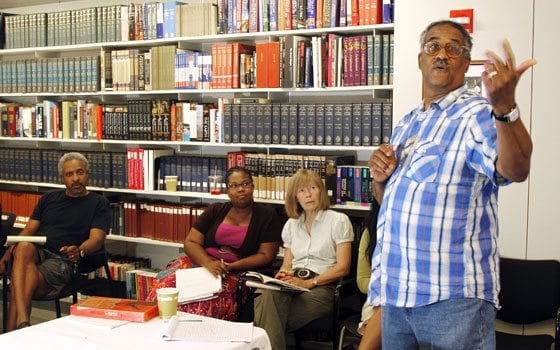
CAMBRIDGE, Mass. — Every semester, Cheryl Carpenter tries to think of new ways to introduce Zora Neale Hurston’s “Their Eyes Were Watching God” to her college students.
An English instructor at Alabama AandM, a historically black college in Normal, Ala., Carpenter said students sometimes are confused about the setting and context of the 1937 novel about an independent black woman’s quest for identity.
But after listening to Temple University history professor Bettye Collier-Thomas talk at a Harvard University program how she dove into dusty attics and forgotten archival material to research her book on black women leaders, Carpenter said she immediately came up with ideas to recreate visual scenes through her lectures.
Carpenter and around two dozen college teachers from around the country are participating this month in a Harvard program aimed at training professors to integrate more black history into their classrooms and research projects.
The “National Endowment for the Humanities Summer Institute for College Teachers” at the university’s W.E.B. Du Bois Institute brought the group to Cambridge for an intensive three-week program, including archival research, debates on history and lectures by some of the nation’s leading scholars in black studies.
“This is amazing,” Carpenter said. “I’m not a historian. I teach English so I don’t go to the archives much. But the topics we’ve talked about cover so much and now I have so many ideas.”
Among those giving lectures were Pulitzer Prize winners Eric Foner and Steven Hahn.
“Very rarely will these participants have access to so many scholars like this at one time,” said University of South Carolina history professor Patricia Sullivan, a co-director of the program. “And they see very quickly that the civil rights movement didn’t start in the 1950s. There’s a whole history that is overlooked and it’s not just about black history. It’s American history.”
The program was founded in the mid-1990s by Sullivan, Du Bois Institute director Henry Louis Gates Jr. and University of California-Berkeley history professor Waldo Martin. They wanted a way to introduce college teachers from different disciplines to new scholarship on black civil rights, from Emancipation to the 1960s. Teachers are urged to use the scholarship to develop new curriculum and programs for their classrooms.
Martin said a number of projects have come of the program, including an anthology edited by a former participant on the literature of the civil rights movement.
Sid Bedingfield, a journalism professor at University of South Carolina and former CNN senior producer, said he has been inspired by the program to create a media course on black press from the time of slavery and also show how slaves used other forms of communication to spread the word of events that affect them, such as President Abraham Lincoln’s victory.
“I really enjoyed Steve Hahn’s book ‘A Nation under Our Feet,’” said Bedingfield, who helped organize a symposium on media and civil rights earlier this year. “He makes the case that slaves weren’t submissive, and he talks about the communication channels that slaves used. That gave me ideas for a new course.”
During a recent afternoon in the program, Bedingfield and the other participants gathered to listen to Collier-Thomas discuss how she came across old minutes from the groups started by black women and what she found in the homes of black residents in Milledgeville, Ga. Most of the material was disorganized but too valuable to ignore, she said.
Her suggestion — always carry two notebooks: one for material for targeted research; the other for “stumbled upon material” for future projects.
“And bring a portable copier if you go to historical black colleges and black people’s homes,” Collier-Thomas said. “They have a ton of great material but they don’t want it to leave their possession.”
Tiffany Wheeler, an education professor at Transylvania University in Lexington, Ky., said so far the program has been intense “but in a positive way.” She said that after listening to a few lectures, she was inspired to propose new courses on race and inequality. “At our fingertips were the most cutting-edge scholars,” said Wheeler. “This has been great.”
Emily Lieb, a history professor at Matteo Ricci College at Seattle University, said not only were the research techniques helpful but the readings were also. “It’s hard to find time to just get away and read what other people are working on,” she said. “It was nice to see that.”
Christopher Bonastia, a sociology professor at Lehman College in the Bronx, N.Y., who just finished a book on a Virginia school that closed for a while to avoid desegregation, said the program also planted seeds for future projects.
“I don’t know what I’m doing next,” said Bonastia. “But now I think I have a few ideas.”
Associated Press






